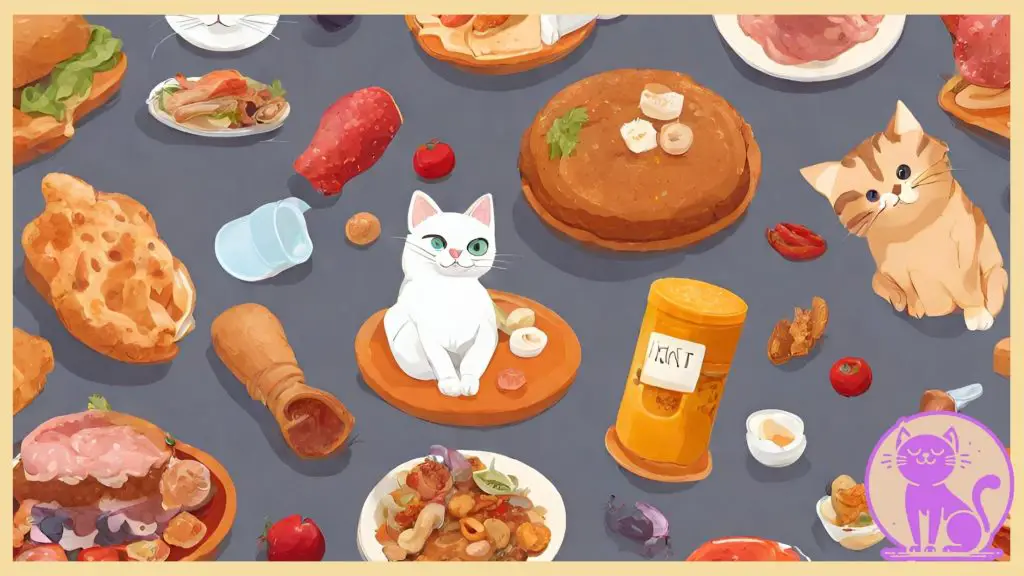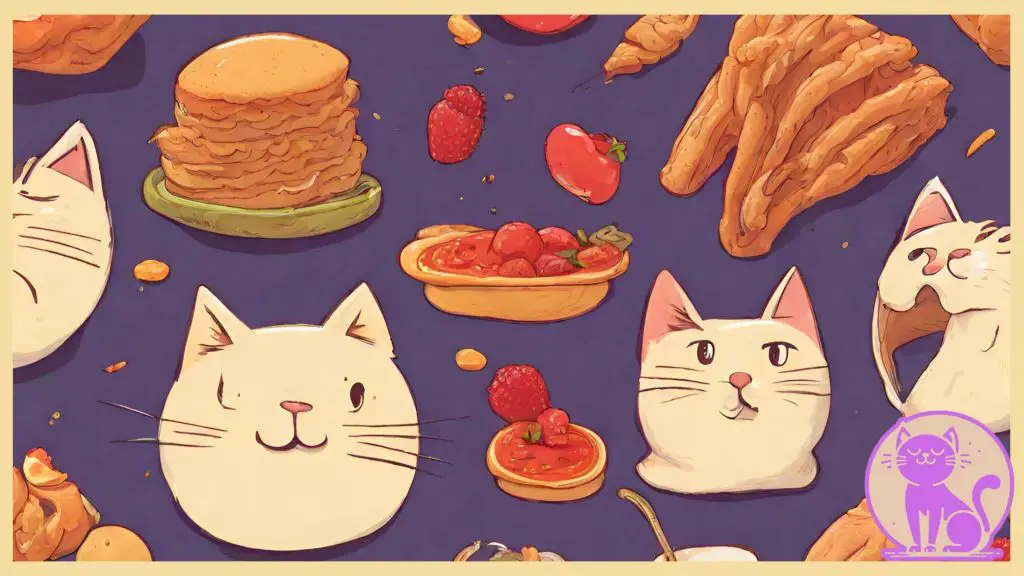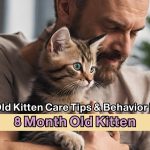As cat owners, we want to ensure that our feline friends stay healthy and happy. But did you know that some foods we commonly assume are harmless can actually be dangerous for cats? In fact, certain foods can be toxic to our beloved pets, posing serious health risks. So, what are these foods that cats should steer clear of? Let’s explore together, as we delve into the world of foods bad for cats.
Are you aware of the hidden dangers lurking in your pantry or refrigerator? Can you guess which common food items could be harmful to your cat’s well-being? It’s time to find out. Let’s uncover the truth about cat toxic foods and challenge any misconceptions you may have. Buckle up, because this journey through the perilous world of forbidden feline foods is about to begin!
Chocolate and Caffeine

When it comes to foods that are bad for cats, chocolate and caffeine are at the top of the list. Both substances are toxic to our feline friends and can have serious consequences for their health.
Chocolate contains theobromine, a compound that kittens do not metabolize effectively. As a result, even small amounts of chocolate can cause a range of symptoms in cats, including restlessness, increased heart rate, tremors, vomiting, and diarrhea. In severe cases, chocolate ingestion can even lead to heart issues and, in some cases, be fatal for our beloved pets.
Caffeine, whether found in coffee, tea, or energy drinks, is also harmful to cats. The stimulating effects of caffeine on the central nervous system can lead to similar symptoms as chocolate ingestion, such as restlessness, increased heart rate, and tremors. However, it can also cause more severe symptoms like seizures and cardiac arrhythmias.
Theobromine Levels in Different Types of Chocolate:
| Type of Chocolate | Theobromine Content (mg per ounce) |
|---|---|
| Dark Chocolate | 130-450 |
| Milk Chocolate | 44-58 |
| White Chocolate | Negligible |
As responsible cat owners, it is our duty to keep chocolate and caffeine-containing products far out of our cats’ reach. Avoid sharing these treats with your feline friends, and ensure that any potential sources of chocolate or caffeine are securely stored away.
If you suspect that your cat has ingested chocolate or caffeine, it’s important to contact your veterinarian immediately. They can provide guidance and take appropriate action to minimize the potential harm caused by these toxic substances.
Onions and Garlic
Onions and garlic may seem like harmless ingredients in our meals, but they can be extremely harmful to our feline friends. These foods contain compounds that can damage a cat’s red blood cells, leading to a condition called anemia. It is crucial to keep onions and garlic away from your cat’s diet to ensure their health and well-being.
The Dangers of Onions and Garlic
Both onions and garlic contain substances called thiosulphates, which are toxic to cats. When ingested, these substances can cause damage to a cat’s red blood cells, leading to a decreased ability to transport oxygen throughout the body. Over time, this can result in anemia, a condition characterized by weakness, pale gums, and lethargy in cats.
Furthermore, cats are more susceptible to the harmful effects of onions and garlic compared to other animals. Their bodies lack certain enzymes needed to properly metabolize these substances, making them more prone to complications.
Signs of Onion and Garlic Toxicity
If your cat has consumed onions or garlic, it is crucial to watch out for signs of toxicity. Some common symptoms include:
- Vomiting
- Diarrhea
- Pale gums
- Weakness
- Lack of appetite
- Increased heart rate
Preventing Onion and Garlic Consumption
To keep your cat safe, it is essential to prevent their exposure to onions and garlic. Make sure to store these ingredients securely in closed cabinets or areas that are out of reach for your cat. Avoid feeding your cat any foods that contain even small amounts of onions or garlic, such as onion soup or garlic bread.
If you suspect your cat has ingested onions or garlic, it is essential to seek veterinary advice immediately. The veterinarian can provide guidance on the necessary steps to ensure your cat’s well-being and may recommend treatments such as fluid therapy or blood transfusions if needed.
| Foods to Avoid | Common Foods Containing Onions and Garlic |
|---|---|
| Raw onions | Onion powder |
| Raw garlic | Garlic powder |
| Onion soup | Garlic bread |
Grapes and Raisins

Grapes and raisins may seem like harmless snacks, but they can be extremely dangerous for cats. Even small amounts of these fruits can lead to kidney failure in felines, which can be life-threatening. It’s crucial to understand the potential risks associated with feeding grapes and raisins to cats and to keep these foods away from them at all times.
Although the exact reason behind grapes and raisins’ toxicity to cats is not yet fully understood, it has been observed that these fruits can cause severe kidney damage in cats. The symptoms of grape or raisin ingestion in cats typically include vomiting, diarrhea, lethargy, loss of appetite, and increased thirst and urination.
If you suspect that your cat has ingested grapes or raisins, it is essential to seek veterinary attention immediately. Time is of the essence when it comes to treating grape or raisin toxicity, as prompt medical intervention can increase the chances of a successful recovery for your furry friend.
Risk of Grape and Raisin Toxicity in Cats
The exact toxic mechanism of grapes and raisins in cats is still unknown, but research suggests that these fruits contain substances that can significantly impair kidney function in felines. Kidney failure due to grape or raisin ingestion can occur within a few hours or may be delayed by up to 72 hours.
While the toxic component in grapes and raisins that affects cats remains unidentified, it is important to recognize that cats have a lower tolerance for certain substances compared to other animals, such as dogs. Therefore, even a small amount of grapes or raisins can have severe consequences for your feline companion.
Preventing Grape and Raisin Toxicity
The best way to protect your cat from grape or raisin toxicity is to ensure these fruits are inaccessible to them. Keep grapes and raisins securely stored in sealed containers and away from countertops or tables where your cat may be tempted to explore.
It is also essential to educate yourself and others in your household about the potential dangers of grapes and raisins for cats. Encourage responsible snacking habits and always check ingredients in meals or treats to ensure they are free from any grape or raisin components.
| Foods Bad for Cats | |
|---|---|
| Grapes | Raisins |
Dairy Products
Contrary to popular belief, most cats are lactose intolerant, making dairy products like milk and cheese unsuitable for their consumption. Feeding cats dairy items can lead to digestive issues and discomfort.
When cats consume dairy products, their bodies lack the necessary enzyme, lactase, to break down lactose – the sugar found in milk. As a result, the undigested lactose can cause gastrointestinal issues such as bloating, gas, and diarrhea in cats.
If a cat consumes dairy and experiences diarrhea or vomiting, it is important to consult a veterinarian. They can provide guidance on managing the cat’s digestive issues and offer alternatives to dairy that are safe for feline consumption.
Instead of dairy products, there are several cat-friendly alternatives that can be incorporated into their diet. These include specially formulated lactose-free milk for cats or providing water as their primary source of hydration.
| Foods | Potential Effects on Cats |
|---|---|
| Milk | Digestive issues such as diarrhea and vomiting due to lactose intolerance |
| Cheese | Same digestive issues resulting from lactose content |
Cats rely on proper nutrition to thrive, and it is crucial to provide them with a balanced diet that meets their specific dietary needs. Avoiding dairy products and introducing suitable alternatives can help ensure that cats remain healthy and free from digestive issues.
Raw Meat and Fish

While cats are natural carnivores and require a diet rich in meat, it is important to understand the risks associated with feeding them raw meat and fish. Raw meats, such as beef, poultry, and seafood, can contain harmful bacteria, parasites, and even toxins that may lead to food poisoning or gastrointestinal problems in cats.
The foods bad for cats include undercooked or raw meats and fish that have not been properly handled or prepared. These foods can pose a significant health risk to your feline friend, potentially causing symptoms such as vomiting, diarrhea, and abdominal pain.
Raw fish, such as salmon, trout, and tuna, can be especially dangerous for cats. They may carry the parasite known as neorickettsia helminthoeca, which causes a condition called “salmon poisoning disease.” This condition can be fatal for cats if left untreated, causing symptoms like fever, vomiting, diarrhea, and dehydration.
Dangerous foods for cats like raw meat and fish should be avoided to ensure the well-being of your beloved pet. Instead, it is recommended to feed them cooked meats that have been properly prepared and handled to eliminate any potential risks. By cooking the meat thoroughly, you can kill harmful bacteria and parasites, making it safer for your cat to consume.
In summary, while cats have a natural inclination for meat, it’s crucial to understand that harmful foods for cats like raw meat and fish can pose serious health risks. Always opt for cooked meats that are properly prepared to provide a safe and nutritious diet for your feline companion.
Alcohol
When it comes to keeping your cat safe, steering clear of alcohol is essential. Even small amounts of alcohol can be highly toxic to felines. Showcase safety by ensuring that your beloved pet does not have access to any alcoholic beverages.
Alcohol ingestion can lead to a range of potential risks and symptoms in cats. These may include vomiting, coordination issues, depression, difficulty breathing, and even coma. The toxic effects of alcohol on felines are alarming, making it a substance that should never be consumed by your cat.
As a responsible cat owner, it is crucial to keep alcohol inaccessible to your feline companion. This means keeping glasses, cups, or bottles containing alcohol away from areas where your cat can reach them. Preventive measures are crucial to avoid accidental ingestion which can lead to serious health issues.
Remember, cats cannot metabolize alcohol like humans can. Their smaller size and different metabolism make even a small amount of alcohol dangerous and potentially fatal. Protect your furry friend by providing a safe environment free from alcohol.
Artificial Sweeteners

While artificial sweeteners may be a tempting alternative to sugar for humans on a diet, they can have devastating effects on our feline friends. Specifically, sweeteners like xylitol can be extremely dangerous for cats and should be strictly avoided.
When ingested by cats, artificial sweeteners can cause a dangerous drop in their blood sugar levels, leading to symptoms such as weakness, seizures, and even coma. In some cases, the consumption of artificial sweeteners can also result in liver failure, which can be life-threatening for cats.
To protect your beloved feline companion, it is crucial to keep any products containing artificial sweeteners out of their reach. Be mindful of ingredient lists and avoid feeding your cat foods that may contain these harmful additives.
The Dangers of Artificial Sweeteners for Cats
Artificial sweeteners, such as xylitol, pose a significant risk to cats due to their inability to metabolize these substances effectively. The consumption of even small amounts of artificial sweeteners can disrupt a cat’s delicate glucose balance, causing a sudden drop in blood sugar levels.
This drop in blood sugar, known as hypoglycemia, can lead to a range of symptoms in cats, including lethargy, weakness, seizures, and even loss of consciousness. If left untreated, hypoglycemia can be life-threatening for cats, requiring immediate veterinary attention.
Furthermore, some artificial sweeteners, like xylitol, can also lead to liver failure in cats. The liver plays a vital role in metabolizing xylitol, but cats lack specific enzymes necessary for processing this substance. As a result, the ingestion of xylitol can cause severe liver damage and potentially be fatal.
Foods That May Contain Artificial Sweeteners
It’s essential to be cautious of the foods and products that may contain artificial sweeteners harmful to cats. While some products, such as sugar-free candies and gums, may be obvious culprits, there are other less obvious sources of artificial sweeteners. Table sugar substitutes, diabetic-friendly products, and even certain medications or supplements may contain these dangerous additives.
To protect your cat’s health, carefully read ingredient labels and avoid any items that list artificial sweeteners, especially xylitol, among their components. When in doubt, consult with your veterinarian to ensure the safety of the foods and products you offer your feline companion.
Remember, keeping artificial sweeteners away from your cat can help prevent potentially life-threatening situations and safeguard their well-being.
| Foods to Avoid | Reasons to Avoid |
|---|---|
| Sugar-free candies | May contain artificial sweeteners, which are toxic to cats |
| Sugar substitutes | Can cause a dangerous drop in blood sugar levels and liver failure in cats |
| Diabetic-friendly products | May contain xylitol and other harmful artificial sweeteners |
| Medications and supplements | Some formulations might contain artificial sweeteners, posing a risk to cats |
Conclusion
In conclusion, it is crucial to prioritize your cat’s safety by being mindful of the foods that are bad for them. Feeding your feline companion a diet that is specifically designed for their nutritional needs is essential for their overall well-being.
By avoiding foods that are not safe for cats, you can minimize the risk of potential health issues and ensure that your beloved pet remains healthy and happy. Remember to keep these harmful foods out of your cat’s reach to prevent accidental ingestion.
Providing a balanced and nutritious diet, along with regular veterinary care, will help maintain your cat’s optimal health and longevity. So, always consult with your veterinarian and make informed choices when it comes to your cat’s diet.
Keep your furry friend safe by staying informed about cat food dangers and staying vigilant about what your cat consumes. By doing so, you’ll help ensure a vibrant and joyful life for your beloved cat for years to come.
FAQ
Q: What makes chocolate and caffeine toxic to cats?
A: Chocolate and caffeine contain substances called methylxanthines, which can cause symptoms ranging from restlessness and increased heart rate to tremors, seizures, and even heart issues in cats. It’s best to keep these substances away from your feline friend’s diet altogether.
Q: Why are onions and garlic harmful to cats?
A: Both onions and garlic contain compounds that can damage a cat’s red blood cells, leading to a condition called Heinz body anemia. It’s crucial to keep any food containing onions or garlic away from your cat.
Q: How can grapes and raisins be dangerous for cats?
A: Grapes and raisins, even in small amounts, can cause kidney failure in cats. The exact mechanism is unknown, so it’s best to avoid feeding these fruits to your feline companion.
Q: Can cats consume dairy products like milk or cheese?
A: Most cats are lactose intolerant, meaning they lack the necessary enzymes to properly digest lactose in milk and other dairy products. Feeding cats dairy items can lead to digestive issues like diarrhea and upset stomachs. It’s best to avoid giving your cat dairy products altogether.
Q: Why should cats not be given raw meat and fish?
A: While cats are natural carnivores, raw meat and fish can contain harmful bacteria, parasites, and even toxins that may lead to food poisoning or gastrointestinal problems in cats. It’s crucial to only feed your cat cooked meats.
Q: Is alcohol dangerous for cats?
A: Yes, alcohol is highly toxic to cats, even in small amounts. Ingestion of alcohol can cause symptoms such as decreased coordination, vomiting, seizures, and even coma. Make sure to keep all alcoholic beverages safely out of your cat’s reach.
Q: Why should artificial sweeteners be avoided in a cat’s diet?
A: Artificial sweeteners like xylitol can cause a dangerous drop in a cat’s blood sugar levels and may lead to liver failure. It’s crucial to avoid offering any foods or beverages containing artificial sweeteners to your cat.
Q: What foods should I avoid feeding my cat to keep them safe?
A: To keep your cat safe, avoid giving them foods such as chocolate, caffeine, onions, garlic, grapes, raisins, dairy products, raw meat, fish, alcohol, and any foods containing artificial sweeteners. Stick to a diet specifically designed for feline health and well-being.








